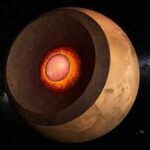Back in 1930, an American astronomer Clyde W. Tombaugh was the first to discover Pluto. Always an outlier on the list of planets, Pluto orbits at a greater distance not only from the Sun but also from other bodies in our system. But recently, astronomers decided Pluto was not worthy of a planetary status. How so? After all, many researchers and space scientists are still fascinated with Pluto, so there’s a lot of knowledge about it that we should explore. Let’s start with the most pressing question – why is Pluto not a planet anymore? Let’s see what this mystery is all about and try to solve it together.
When did Pluto stop being a planet and why?
On August 24, 2006, it was announced that Pluto was no longer a planet. Even if it was for almost 80 years, the International Astronomical Union (IAU) decided to change our Solar System’s number of planets from nine to eight. Initially considered our ninth planet, Pluto is much smaller than Mercury and satellites of other planets. It’s not like any terrestrial planet, gas, or ice giant out there.
After space observatories became more technologically advanced to explore our Solar System’s outskirts, Pluto was given a closer look. Around the time the Kuiper Belt was discovered in the early 1990s, scientists also started discovering exoplanets. This spurred many astronomers to doubt our current classification approach of what makes a celestial object into a planet. There are three main criteria an object needs to meet, which we will discuss a little later in this article. But first, let’s learn who decided why is Pluto not a planet anymore.
Who made Pluto not a planet?
<img alt=”Solar system planets”>
Funnily enough, IAU astronomers simply voted Pluto out. The IAU conference that demoted Pluto from the list of planets was held in Prague. The first speaker here was Owen Gingerich, a distinguished Harvard science historian and astronomer, who said that the “term” planet no longer has the same meaning and is culturally defined.
Still, this decision had its opponents, too. Planetary scientist Alan Stern, for example, said that he thinks the IAU decision is irrelevant. Dimitar Sasselov, the director of Harvard’s Planets and Life initiative, didn’t agree with this decision either. But democracy is a democracy, and Pluto lost its status after a vote. Still, these scientists, along with other disagreeing astronomers, are studying why is Pluto not a planet any longer. It’s possible that in a few years, they will gather enough evidence to contradict the majority’s opinion.
What are the 3 criteria for a planet?
Orbital Today explains that, according to IAU’s definition, three criteria for a planet are:
- Revolution around its star.
- Enough gravity to be spherical.
- The capability of clearing its orbit from other objects of similar size and by using its own gravity.
The reason why Pluto is not a planet is that it doesn’t satisfy the last criterion. There are many small objects in Pluto’s orbit, but its gravity is not enough to attract them – for example, as our Earth keeps our Moon in its place or as Saturn ‘created’ entire ring systems around itself.
Besides, back in 1978, Pluto lost significant mass, and this played a part in identifying it as a dwarf planet rather than a regular, ‘full-scale’ one. So, indirectly mass and size became additional criteria ‘proving’ why Pluto is not a planet.
Did we lose a planet?
<img alt=”Solar system”>
We can say that we lost a planet ever since the IAU decision was made. Even if Pluto orbits its Sun, there’s still a long way for it to be classified as a planet again. The decision to demote it wasn’t at all popular in the beginning. Mike Brown, one of the astronomers who had a lot to say about this, even released his “How I Killed Pluto and Why It Had It Coming” memoir back in 2010. The discussion of Pluto’s status as a planet lasted for many years. Debates were heated this entire time, and there are still many opponents to IAU’s decision.
What is Pluto if not a planet?
Now that we know what makes Pluto not a planet, what is Pluto, you might ask? We already mentioned the new term – a dwarf planet because it does not mean one criterion, more specifically because it does not exert enough gravity to clear its own orbit from space debris. In other words, dwarf planets are celestial bodies that resemble small planets yet don’t meet all the criteria to be planets. More examples of dwarf planets we know so far are
- Eris, similar in size to Pluto but located further from our Sun;
- Haumea, located beyond Pluto’s obit in the Kuiper Belt;
- Makemake, was also found in the Kuiper Belt beyond Neptune’s orbit.
But what about Pluto? So far, it will retain its dwarf status, despite many opponents. If one day, it clears its orbit from other objects, IAU may have to reconsider this decision – or, perhaps, make a few other discoveries to come up with yet another classification!
Emma Thorpe







